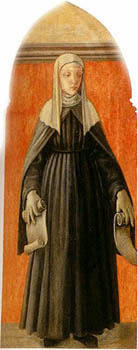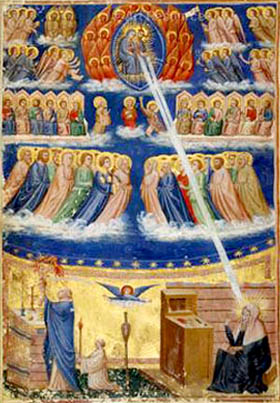 |
The Saint of the Day
St. Bridget of Sweden - July 23
Prof. Plinio Corrêa de Oliveira
Biographical selection:
St. Bridget (1303-1373) was a noble of royal blood from Sweden. In obedience to her father, she married Prince Ulfo of Nercia in 1316. She was the mother of eight children, including St. Catherine of Sweden. After Ulfo’s death in 1344, she dedicated her life to religion. In 1345 she founded the Order of the Most Holy Savior (the Bridgettines) at Vadstena.
Comments of Prof. Plinio:
I remember only one episode from the life of St. Bridget. Therefore, since we don’t have a biographical selection properly speaking, I will comment on it.
She was a person with a very bad temperament with a propensity to irritation and explosions. She married a bad-tempered man who was also difficult to deal with. In her relations with her husband, she had to learn to dominate herself. After a great deal of effort, she reached that point. Then she made pilgrimages, sanctified herself, had meetings with Popes to report the visions she had received from Our Lord and Our Lady. She also became a nun and founded a religious congregation.

St. Bridget of Sweden
Giovanni di Francesco
|
Because St. Bridget had learned to control her impulsive temperament, she thought she had entirely dominated it. But toward the end of her life, that strong passion in her temperament returned completely, just as it was when she was very young. This was a great trial for her, because she thought that the great fight she had made throughout her life had been lost because of some infidelity to God, and that she would have to restart from the beginning again.
So with this sense that everything before had been in vain, she restarted the fight, tamed her temperament once again, and died at peace with God.
Her biographers tell us that this trial was not a punishment for any spiritual failing, but rather a design of Divine Providence to make her even more perfect. So, God let her think that the great spiritual progress she had achieved was futile in order to test her love for Him, to see if she would become impatient and revolt or humbly recommence her efforts from the very beginning in obedience to His will.
This trial was an invitation for her, without her knowledge, to reach the apex of her spiritual life. We should realize this and be prepared should something similar happen in our lives.
Divine Providence very often asks us – either in our spiritual lives or in our works of an apostolate – to face analogous situations that seem to make no sense to us. We have to walk toward walls without doors; we have to dive into oceans without bottoms. But when we walk with the spirit of true obedience to the will of God, at the last moment the doors appear and we can touch the bottom of the ocean with our feet, so that we can continue with the work we are called to do.

St. Bridget receiving a revelation
from Our Lord Jesus Christ and Our Lady
14th century manuscript
|
Our Lady does this with souls that she is preparing for the highest ends. She asks the person to walk through what makes no sense as a proof of love for her. How is this a demonstration of love? It is blind faith in what Divine Providence has asked from one. After passing through that trial, Our Lady and Our Lord give great graces to that person.
Sara, the wife of Abraham, was unable to have children. Notwithstanding, Abraham trusted God’s promise that a great people would come from him. Finally, in their old age a son was born - Isaac, the son of the promise. Then, God asked Abraham to sacrifice Isaac. It made no sense. But Abraham prepared to carry out the will of God. You know the rest. God did not want the immolation of Isaac; what He wanted was to test Abraham’s love for Him. In the Old and New Covenants we find many other men of God who faced similar spiritual trials, even though they were men specially chosen by God.
Since ours is a great vocation to fight against the Revolution, especially the Revolution inside the Church, we should be prepared to face great tribulations in this specific point. All the efforts we made throughout our lives may at one point seem useless and futile. Our Lord and Our Lady - who called us to carry out this vocation - will be preparing us for greater things. We should not be surprised if this will happen.
Let us ask St. Bridget, who suffered this trial at the end of her life, to prepare us to accept such tests without revolt, protest or complaint. And may Our Lady find us worthy to receive similar tribulations.


  | | Prof. Plinio Corrêa de Oliveira | |
The Saint of the Day features highlights from the lives of saints based on comments made by the late Prof. Plinio Corrêa de Oliveira. Following the example of St. John Bosco who used to make similar talks for the boys of his College, each evening it was Prof. Plinio’s custom to make a short commentary on the lives of the next day’s saint in a meeting for youth in order to encourage them in the practice of virtue and love for the Catholic Church. TIA thought that its readers could profit from these valuable commentaries.
The texts of both the biographical data and the comments come from personal notes taken by Atila S. Guimarães from 1964 to 1995. Given the fact that the source is a personal notebook, it is possible that at times the biographic notes transcribed here will not rigorously follow the original text read by Prof. Plinio. The commentaries have also been adapted and translated for TIA’s site.
|
Saint of the Day | Home | Books | CDs | Search | Contact Us | Donate

© 2002- Tradition in Action, Inc. All Rights Reserved
|
 |

|